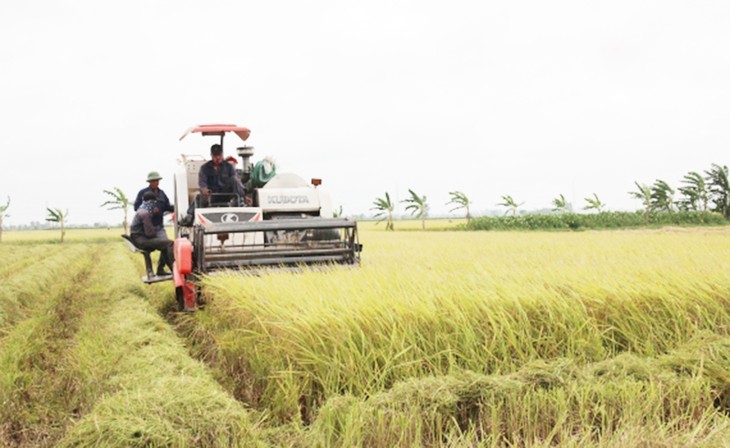(VOVWORLD) - The Communist Party of Vietnam and President Ho Chi Minh paid much attention to the development of the collective and cooperative economy soon after Vietnam regained independence. In this difficult time, on April 11, 1946, President Ho Chi Minh wrote a letter calling for Vietnamese landowners and farmers to join agricultural cooperatives.
 Collective, cooperative economy developed in the new period Collective, cooperative economy developed in the new period |
President Ho Chi Minh said: "Farmers want to be rich, agriculture wants to prosper, there must be cooperatives." and “Cooperatives mean syndicating capital and working together. With more capital and strength, hardship will reduce and benefits will increase." The past 77 years have shown that the collective economy has always been an important economic sector, which must be combined with the state economy to create a solid foundation for the national economy.
Vietnam currently has more than 29,000 registered cooperatives with 7 million member households, mainly in rural areas, and 2.6 million employees.
Correct directions
Through successive periods the Resolutions and Directives of the Communist Party of Vietnam have manifested Vietnam’s development of both the theory and an awareness of the importance of the collective economy in national development.
On June 16, 2022, the Party Central Committee adopted Resolution 20 on continuing to reform, develop, and improve the efficiency of the collective economy in the new period. The Resolution says: "The collective economy is an important economic sector that must be strengthened together with the state economy to become a solid foundation of the national economy."
Major resolutions and orientations of the Party have been institutionalized into law, including the 2012 Law on Cooperatives which creates a legal corridor and promotes the development of the cooperative and collective economy.
The National Assembly and related agencies are revising the Law on Cooperatives which is expected to be adopted at the upcoming session of the National Assembly.
The guidelines, policies and laws have promoted creativity, an innovative mindset, use of technology, and investment in the collective economy and cooperative economy.
Vietnam’s collective economy, with cooperatives as the core, exists in many forms (cooperatives, cooperative groups, and alliances of cooperatives). More than 29,000 active cooperatives are contributing 4% of the country's GDP.
Collective economy a solid foundation for the national economy
Minister of Agriculture and Rural Development Le Minh Hoan said leaders at all levels, particularly communal leaders, who directly work with agriculture and farmers, need to change their mindset.
'We need a joint action program to train and raise the awareness of cooperative members, intellectualize and improve the capacity of the leadership of cooperatives, and intellectualize cooperative members who are farmers. We must engage businesses in raw material growing regions to create a new driving force and help farmers realize that when participating in cooperatives, costs are reduced, the market is stable, and they can participate in the manufacturing chain.' said Mr. Hoan.
In the face of small-scale production, weak internal capacity, and loose cohesion between cooperative models, Deputy Minister of Planning and Investment Tran Duy Dong said: 'The Ministry has advised the Government to submit amendments to the Law on Cooperatives to the 15th National Assembly. It’s necessary to synchronize types of cooperatives, stipulate prompt policies on collective economic development, including policies on land, capital, market access, resource access, and human resource development.'
'The draft law amends regulations to remove barriers to the autonomy and self-determination of enterprises. The Ministry has also developed three major projects, including a master program for collective economic development on a national scale and asked the National Assembly to pilot mechanisms and policies to develop a Federation of Cooperatives in order to increase cooperatives’ international competitiveness,' said Mr. Dong.
Being well aware of the position, role, and importance of the collective economy in the socialist-oriented market economy is essential for the development of a collective economic model.
 VOV and the Vietnam Alliance of Cooperatives host a seminar on "Developing the collective economy and cooperatives in the new period." VOV and the Vietnam Alliance of Cooperatives host a seminar on "Developing the collective economy and cooperatives in the new period." |
At a seminar called "Developing the collective economy and cooperatives in the new period", jointly held by the Voice of Vietnam and the Vietnam Alliance of Cooperatives last Thursday, VOV Vice President Pham Manh Hung said: 'The Voice of Vietnam, as one of the leading national press agencies, will widely inform the public of the important contents of the collective economy and cooperative development. We will contribute to the formulation of solutions and amendments to the law. At the same time, we will communicate to remove the skepticism, distortion, denial, and even the elimination of the collective economic model that some unfriendly and hostile individuals and organizations have promoted.'
Under Party Resolution 20, Vietnam aims to engage at least 20% of its population in the collective economy by 2045, scale-up collective economic organizations, and improve their operation on par with other countries in the world. Vietnam also strives to have at least three collective economic organizations among the 300 largest global cooperatives recognized by the International Cooperatives Alliance (ICA).